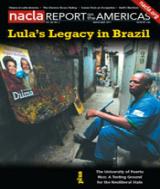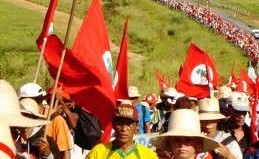Chamber of Deputies approves devastation of the Forest Code under the orders of agribusiness
The Chamber of Deputies decided today that Brazil should not be the country of the future. By 410 votes to only 63, federal deputies approved changes to the Brazilian Forest Code that are set to compromise the country's biodiversity as well as the sustainability of Brazilian agriculture. “Brazil woke up this morning with news of the murder of one of the Amazon Rainforest's strongest advocates,” announced Paulo Adario, director of Greenpeace's Amazon Campaign.

 With the vote on reform of Brazil's Forest Code set for this Tuesday (24), fifteen hundred activists from civil society organizations marched this morning on the Ministries Esplanade in Brasília. “We are opposed to changes that will affect familial and peasant farming.
With the vote on reform of Brazil's Forest Code set for this Tuesday (24), fifteen hundred activists from civil society organizations marched this morning on the Ministries Esplanade in Brasília. “We are opposed to changes that will affect familial and peasant farming.

 By Maria Aparecida
By Maria Aparecida